第36章
''Ow dirty I am, bein' around the w'y I 'ave,' the woman said, as she sat down in a coffee-house, wiping the sleep and grime from the corners of her eyes.'An' the sights I 'ave seen this d'y, an' Ienjoyed it, though it was lonesome by myself.An' the duchesses an'
the lydies 'ad sich gran' w'ite dresses.They was jest bu'ful, bu'ful.'
'I'm Irish,' she said, in answer to a question.'My nyme's Eyethorne.'
'What?' I asked.
'Eyethorne, sir; Eyethorne.'
'Spell it.'
'H-a-y-t-h-o-r-n-e, Eyethorne.'
'Oh,' I said, 'Irish Cockney.'
'Yes, sir, London-born.'
She had lived happily at home till her father died, killed in an accident, when she had found herself on the world.One brother was in the army, and the other brother, engaged in keeping a wife and eight children on twenty shillings a week and unsteady employment, could do nothing for her.She had been out of London once in her life, to a place in Essex, twelve miles away, where she had picked fruit for three weeks- 'An' I was as brown as a berry w'en I come back.You won't b'lieve it, but I was.'
The last place in which she had worked was a coffee-house, hours from seven in the morning till eleven at night, and for which she had received five shillings a week and her food.Then she had fallen sick, and since emerging from the hospital had been unable to find anything to do.She wasn't feeling up to much, and the last two nights had been spent in the street.
Between them they stowed away a prodigious amount of food, this man and woman, and it was not till I had duplicated and triplicated their original orders that they showed signs of easing down.
Once she reached across and felt the texture of my coat and shirt, and remarked upon the good clothes the Yanks wore.My rags good clothes! It put me to the blush; but, on inspecting them more closely and on examining the clothes worn by the man and woman, Ibegan to feel quite well-dressed and respectable.
'What do you expect to do in the end?' I asked them.'You know you're growing older every day.'
'Work'ouse,' said he.
'Gawd blimey if I do,' said she.'There's no 'ope for me, I know, but I'll die on the streets.No work'ouse for me, thank you.'
'No, indeed,' she sniffed in the silence that fell.
'After you have been out all night in the streets,' I asked, 'what do you do in the morning for something to eat?'
'Try to get a penny, if you 'aven't one saved over,' the man explained.'Then go to a coffee-'ouse an' get a mug o' tea.'
'But I don't see how that is to feed you,' I objected.
The pair smiled knowingly.
'You drink your tea in little sips,' he went on, 'making it last its longest.An' you look sharp, an' there's some as leaves a bit be'ind 'em.'
'It's s'prisin', the food wot some people leaves,' the woman broke in.
'The thing,' said the man judicially, as the trick dawned upon me, 'is to get 'old o' the penny.'
As we started to leave, Miss Haythorne gathered up a couple of crusts from the neighboring tables and thrust them somewhere into her rags.
'Cawn't wyste 'em, you know,' said she, to which the docker nodded, tucking away a couple of crusts himself.
At three in the morning I strolled up the Embankment.It was a gala night for the homeless, for the police were elsewhere; and each bench was jammed with sleeping occupants.There were as many women as men, and the great majority of them, male and female, were old.
Occasionally a boy was to be seen.On one bench I noticed a family, a man sitting upright with a sleeping babe in his arms, his wife asleep, her head on his shoulder, and in her lap the head of a sleeping youngster.The man's eyes were wide open.He was staring out over the water and thinking, which is not a good thing for a shelterless man with a family to do.It would not be a pleasant thing to speculate upon his thoughts; but this I know, and all London knows, that the cases of out-of-works killing their wives and babies is not an uncommon happening.
One cannot walk along the Thames Embankment, in the small hours of morning, from the Houses of Parliament, past Cleopatra's Needle, to Waterloo Bridge, without being reminded of the sufferings, seven and twenty centuries old, recited by the author of 'Job':
There are that remove the landmarks; they violently take away flocks and feed them.
They drive away the ass of the fatherless, they take the widow's ox for a pledge.
They turn the needy out of the way; the poor of the earth hide themselves together.
Behold, as wild asses in the desert they go forth to their work, seeking diligently for meat; the wilderness yieldeth them food for their children.
They cut their provender in the field, and they glean the vintage of the wicked.
They lie all night naked without clothing, and have no covering in the cold.
They are wet with the showers of the mountains, and embrace the rock for want of a shelter.
There are that pluck the fatherless from the breast, and take a pledge of the poor.
So that they go about naked without clothing, and being an hungered they carry the sheaves.- Job xxiv.2-10.
Seven and twenty centuries agone! And it is all as true and apposite to-day in the innermost centre of this Christian civilization whereof Edward VII is king.